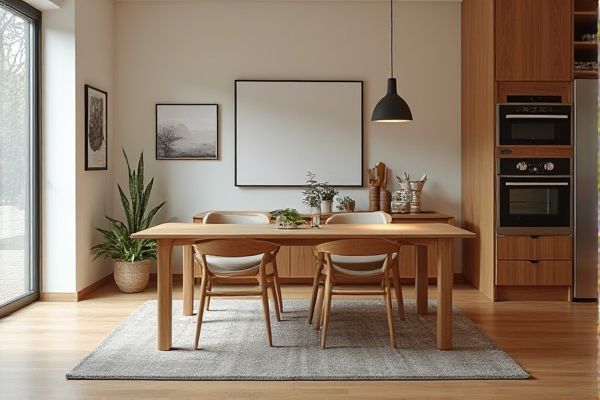
A fold-out table offers versatility and space-saving benefits, making it ideal for small areas or multipurpose rooms, while a fixed table provides stability and a permanent surface for consistent use. Discover which type best suits your needs and how to choose the perfect table for Your space by reading the rest of the article.
Table of Comparison
| Feature | Fold-Out Table | Fixed Table |
|---|---|---|
| Space Efficiency | Highly space-efficient; can be folded when not in use | Occupies constant space; cannot be folded or collapsed |
| Portability | Easily portable due to foldable design | Usually heavy and fixed in place |
| Setup Time | Quick setup and breakdown | No setup required; always ready to use |
| Durability | Potentially less durable due to moving parts | Typically more durable and sturdy |
| Design Versatility | Varied designs with adjustable sizes | Fixed designs with permanent size |
| Cost | Generally more affordable | Often more expensive due to materials and build |
| Use Cases | Ideal for small spaces, casual use, events | Best for permanent setups, formal dining, offices |
Introduction to Fold-Out and Fixed Tables
Fold-out tables offer flexibility by allowing you to save space when not in use, making them ideal for small rooms or multifunctional areas. Fixed tables provide stability and durability with a permanent structure, suitable for consistent daily use and heavier loads. Your choice depends on whether you prioritize space efficiency or long-term sturdiness in your furniture.
Key Differences Between Fold-Out and Fixed Tables
Fold-out tables offer flexible space-saving features ideal for small rooms or multi-functional areas, while fixed tables provide stable, permanent surfaces with consistent design and durability. Fold-out tables often utilize hinges and collapsible legs, allowing easy transformation between compact and expanded forms, whereas fixed tables have a solid frame that supports heavier loads and long-term use. Choosing between fold-out and fixed tables depends on balancing portability and space efficiency against sturdiness and aesthetic permanence.
Space Efficiency: Fold-Out vs Fixed Tables
Fold-out tables offer superior space efficiency by collapsing when not in use, making them ideal for small rooms or apartments where maximizing floor space is essential. Fixed tables occupy a constant footprint, limiting flexibility in tight living areas or multifunctional spaces. Your choice depends on whether you prioritize permanent, stable surfaces or adaptable furniture that saves space.
Durability and Stability Comparison
Fold-out tables feature hinges and joints that may experience wear over time, potentially reducing durability compared to fixed tables, which are constructed as single solid units designed for long-lasting stability. Fixed tables offer greater stability due to their rigid frame and fewer moving parts, making them ideal for heavy use and uneven surfaces. In contrast, fold-out tables prioritize portability but may sacrifice some structural integrity, leading to increased risk of wobbling or damage under heavy loads.
Design and Aesthetic Flexibility
Fold-out tables offer versatile design options with their compact, space-saving mechanism, making them ideal for small or multifunctional rooms. Fixed tables provide a stable, consistent aesthetic with a broad range of styles and materials, enhancing room decor through their more substantial presence. Both designs cater to different spatial and stylistic needs, influencing interior design decisions based on room size and functional requirements.
Installation and Assembly Considerations
Fold-out tables require minimal installation, often featuring simple mounting brackets or hinges that allow easy folding and quick setup without extensive tools. Fixed tables demand a more complex assembly process, involving securing legs or bases firmly to ensure stability and sometimes requiring professional installation for heavier models. Your choice depends on available space and whether you prefer a quick, versatile setup or a permanently stable surface.
Cost Analysis: Fold-Out vs Fixed Tables
Fold-out tables generally offer cost savings due to their space-saving design and versatility, making them ideal for small living areas or multipurpose rooms. Fixed tables tend to have higher upfront costs because of their robust construction and premium materials, but they often provide greater durability and stability over time. When evaluating cost-effectiveness, fold-out tables minimize initial investment and maximize functional use, whereas fixed tables represent a long-term investment with fewer maintenance concerns.
Ideal Use Cases for Each Table Type
Fold-out tables are ideal for small spaces and multifunctional rooms where saving space is essential, such as apartments, offices, or craft rooms, allowing for easy storage and expanded workspace when needed. Fixed tables provide stability and durability, making them perfect for dining rooms, conference rooms, or areas with frequent use where a permanent, sturdy surface is required. The choice depends on space constraints and functional needs, with fold-out tables excelling in flexibility and fixed tables offering consistent reliability.
Maintenance and Longevity
Fold-out tables require regular checking of hinges and joints to prevent wear and ensure smooth folding mechanisms, which helps maintain their functionality over time. Fixed tables typically have fewer moving parts, resulting in lower maintenance needs and often greater durability for long-term use. Your choice should consider how much upkeep you're willing to invest relative to the table's intended lifespan and usage frequency.
Making the Right Choice for Your Space
Fold-out tables offer versatile space-saving solutions, ideal for small rooms or multifunctional areas where maximizing floor space is essential. Fixed tables provide stability and a sturdy surface, making them suitable for dedicated dining rooms or offices requiring consistent size and support. Your decision should balance room dimensions, usage frequency, and the need for flexibility to optimize both comfort and functionality.
 homyna.com
homyna.com